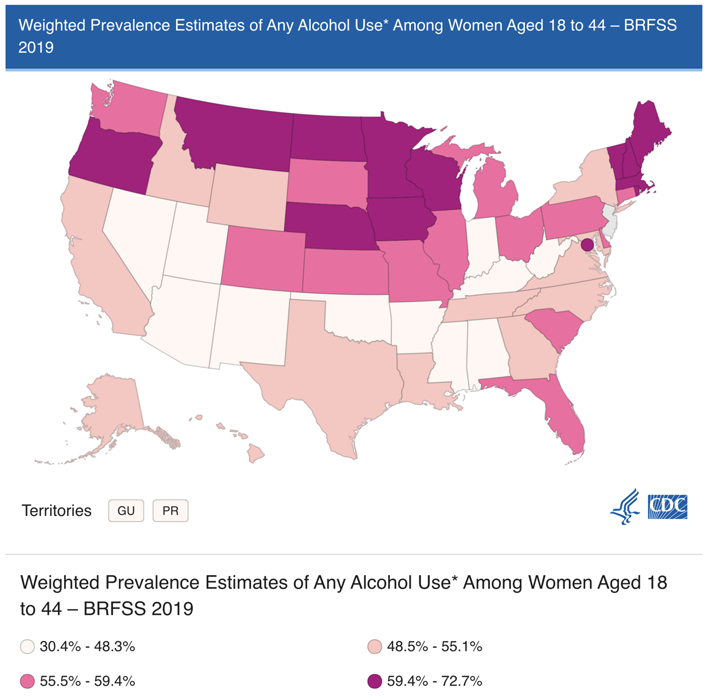Alcohol Addiction and Fetal Alcohol Syndrome

Someone who struggles with an addiction to drugs or alcohol is a person who needs help, who needs treatment as soon as possible. In most cases, an addict is not someone who deserves criticism, condemnation, vilification, or punishment. People who are addicted to drugs face varying harms, with accidents, injuries, illnesses, losses, and even death being the unfortunate yet daily effects of substance abuse. People who suffer these trials need help, not condemnation.
But people who struggle with addiction also harm those around them, further emphasizing the need for them to get help. Family members, loved ones, friends, coworkers, and children all suffer when someone they care about abuses drugs and alcohol.
For pregnant mothers or women who are trying to get pregnant and who are also struggling with alcohol addiction, they must get help as soon as possible. An addiction to alcohol causes immense harm, both to the mother and to her child.
What is Fetal Alcohol Syndrome?

Fetal Alcohol Syndrome is the technical term for a condition in which a baby is born to a mother who had misused alcohol while pregnant. The Centers for Disease Control and Prevention define the term as follows: “Fetal alcohol spectrum disorders (FASDs) are a group of conditions that can occur in a person whose mother drank alcohol during pregnancy. These effects can include physical problems and problems with behavior and learning. Often, a person with an FASD has a mix of these problems. FASDs are caused by a woman drinking alcohol during pregnancy. Alcohol in the mother’s blood passes to the baby through the umbilical cord.” Because there is no safe level of alcohol consumption for a pregnant woman, any amount of drinking creates risk for FAS.
“Fetal alcohol spectrum disorders (FASDs) are a group of conditions that can occur in a person whose mother drank alcohol during pregnancy. These effects can include physical problems and problems with behavior and learning.”
It’s important to understand that FAS is a spectrum, not a singular congenital diagnosis. There is FAS (Fetal Alcohol Syndrome) which is the most common. But there are also conditions like Alcohol-Related Neurodevelopmental Disorder (ARND), Alcohol-Related Birth Defects (ARBD), and Neurobehavioral Disorder Associated with Prenatal Alcohol Exposure (ND-PAE).
How Prevalent is FAS?
It is difficult to determine exactly how prevalent FAS is. However, the CDC estimates that FAS is more widespread now than it used to be. A 2019 CDC report found that one in nine pregnant women reported drinking alcohol in the past 30 days, suggesting that perhaps more than 10% of babies may be born with some type of FAS condition.
Another report published in the American Journal of Preventive Medicine found that alcohol misuse has increased among pregnant women. Quoting an excerpt of that study, “Current drinking (having at least one drink of any alcoholic beverage in the past 30 days) increased from 9.2% in 2011 to 11.3% in 2018. Binge drinking (having four or more drinks on an occasion during the past 30 days) increased from 2.5% to 4.0% in that same time period.” It’s likely that one of the reasons why alcohol misuse is going up among pregnant women is because alcohol misuse is going up among the entire American population as a whole. The general population is drinking more alcohol, and pregnant mothers have been pulled into that harmful trend.
But what about the actual number of FAS cases? While it’s challenging to determine exact figures, there is some data. Again according to the CDC, it is estimated that anywhere from 1 to 9 infants are born with a serious case of FAS for every 1,000 live births in the United States. Some experts believe that as many as 1 out of every 100 children are born with some degree of FAS, though their condition may not be as serious.

The stark prevalence of FAS and its variations is indicative of a few adverse situations in American society. For one, alcohol abuse is quite common in American society and not taken seriously enough. Also, women who are addicted to alcohol may feel stereotyped or shamed for their addiction, making them feel like they cannot speak openly about their condition. That might prevent them from reaching out for help. Also, alcohol addiction treatment is not being made readily available to enough alcohol-addicted women, to the point where women who are addicted may want to get help before getting pregnant, but they might be unable to do so due to a lack of access to qualified treatment centers.
Real Risk; The Effects on Babies Born to Mothers Addicted to Alcohol
The signs and symptoms of FAS vary greatly. Again citing the CDC, some of these indicators include:
- Low body weight or birth weight.
- Poor coordination and motor control.
- Degrees of hyperactive behavior.
- Difficulty with attention or memory.
- Difficulty in all levels of school.
- Speech and language delays and impairment.
- Degrees of intellectual disability or low IQ.
- Poor reasoning and judgment skills, poor decision making.
- Problems with sleep and sucking as a baby.
- Vision or hearing problems, both as a child and as an adult.
- Various problems with the heart, kidneys, or bones.
- Shorter-than-average height for both boys and girls.
- Small head size, large eyes, and other distinctive facial features (such as a smooth ridge between the nose and upper lip).
As one can imagine, the more alcohol an expecting mother drinks, and the longer she drinks it for, the more severe the FAS symptoms are likely to be. Again quoting the CDC, “Drinking alcohol during pregnancy can cause miscarriage, stillbirth, and a range of lifelong physical, behavioral, and intellectual disabilities. Drinking alcohol in the first three months of pregnancy can cause the baby to have abnormal facial features. Growth and central nervous system problems can occur from drinking alcohol anytime during pregnancy. The baby’s brain is developing throughout pregnancy and can be affected by exposure to alcohol at any time.” The only way to be certain that a baby is not affected by a mother’s alcohol addiction is for the mother to seek treatment before getting pregnant.
Treatment is the Answer; Helping Would-Be Mothers Get Off Alcohol First

On the one hand, it’s important not to condone alcohol addiction among pregnant mothers. But at the same time, it’s equally important not to condemn or vilify expecting mothers who are addicted to alcohol. Criminalizing or shaming addicts does not work. Doing so just increases the stigmas and stereotypes that follow addicts everywhere they go, ultimately making it less likely that they’ll ever reach out for help.
Women, and all Americans for that matter, need access to addiction treatment. And they need to be encouraged to seek treatment as soon as they begin misusing substances. If you know a woman who is using alcohol and who cannot stop using it, make sure she gets help as soon as possible. Do not let her alcohol misuse continue untreated. If she has plans to get pregnant soon, make sure she gets help for her drinking before she gets pregnant. Doing so is the right thing for her and her future children.
Sources:
- https://www.cdc.gov/ncbddd/fasd/facts.html
- https://www.cdc.gov/ncbddd/fasd/data.html
- https://www.ajpmonline.org/article/S0749-3797(20)30265-8/fulltext
- https://jamanetwork.com/journals/jamanetworkopen/fullarticle/2770975
- https://www.cdc.gov/ncbddd/fasd/alcohol-use.html


